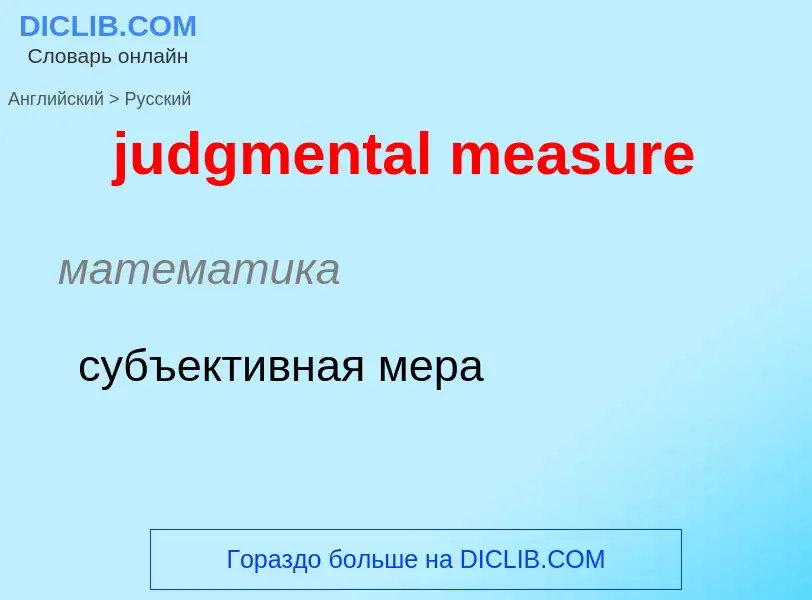Перевод и анализ слов искусственным интеллектом ChatGPT
На этой странице Вы можете получить подробный анализ слова или словосочетания, произведенный с помощью лучшей на сегодняшний день технологии искусственного интеллекта:
- как употребляется слово
- частота употребления
- используется оно чаще в устной или письменной речи
- варианты перевода слова
- примеры употребления (несколько фраз с переводом)
- этимология
judgmental measure - перевод на русский
математика
субъективная мера
['ki:p'daun]
общая лексика
не вставать, продолжать сидеть или лежать
подавлять (восстание чувство)
держать в подчинении
уничтожать
оставлять на второй год
фразовый глагол
общая лексика
продолжать сидеть или лежать
не вставать
не поднимать
подавлять
сдерживать
мешать успеху
росту и т. п.
не допускать повышения
Определение
Википедия
In mathematics, a probability measure is a real-valued function defined on a set of events in a probability space that satisfies measure properties such as countable additivity. The difference between a probability measure and the more general notion of measure (which includes concepts like area or volume) is that a probability measure must assign value 1 to the entire probability space.
Intuitively, the additivity property says that the probability assigned to the union of two disjoint events by the measure should be the sum of the probabilities of the events; for example, the value assigned to "1 or 2" in a throw of a dice should be the sum of the values assigned to "1" and "2".
Probability measures have applications in diverse fields, from physics to finance and biology.

![0-521-62128-3}} [https://books.google.com/books?id=Q1AUhivGmyUC&pg=PA149 page 149]</ref> 0-521-62128-3}} [https://books.google.com/books?id=Q1AUhivGmyUC&pg=PA149 page 149]</ref>](https://commons.wikimedia.org/wiki/Special:FilePath/Maxwell-Distr.png?width=200)
, as Vicentio in 'Measure for Measure' by William Shakespeare, 1794 British School Victoria and Albert Museum.jpg?width=200)
![Robert Smirke]] (n.d.) Robert Smirke]] (n.d.)](https://commons.wikimedia.org/wiki/Special:FilePath/'Measure for Measure', Act II, Scene 1, the Examination of Froth and Clown by Escalus and Justice (from the Boydell series) Robert Smirke (1753–1845) Royal Shakespeare Theatre.jpg?width=200)
![The first page of Shakespeare's ''Measure for Measure'', printed in the [[First Folio]] of 1623 The first page of Shakespeare's ''Measure for Measure'', printed in the [[First Folio]] of 1623](https://commons.wikimedia.org/wiki/Special:FilePath/First-page-first-folio-measure-for-measure.jpg?width=200)
![William Hamilton]] of Isabella appealing to Angelo William Hamilton]] of Isabella appealing to Angelo](https://commons.wikimedia.org/wiki/Special:FilePath/Isabella appealing to Angelo (Hamilton, 1793).jpg?width=200)
![''Mariana'' (1851) by [[John Everett Millais]] ''Mariana'' (1851) by [[John Everett Millais]]](https://commons.wikimedia.org/wiki/Special:FilePath/John Everett Millais - Mariana - Google Art Project.jpg?width=200)
![Pompey Bum, as he was portrayed by nineteenth-century actor [[John Liston]] Pompey Bum, as he was portrayed by nineteenth-century actor [[John Liston]]](https://commons.wikimedia.org/wiki/Special:FilePath/John Liston as Pompey in Measure for Measure by William Shakespeare (cropped).jpg?width=200)
![''Mariana'' (1888) by [[Valentine Cameron Prinsep]] ''Mariana'' (1888) by [[Valentine Cameron Prinsep]]](https://commons.wikimedia.org/wiki/Special:FilePath/Prinsep - Mariana.jpg?width=200)
![''Isabella'' (1888) by [[Francis William Topham]] ''Isabella'' (1888) by [[Francis William Topham]]](https://commons.wikimedia.org/wiki/Special:FilePath/Topham - Isabella.jpg?width=200)
![''Claudio and Isabella'' (1850) by [[William Holman Hunt]] ''Claudio and Isabella'' (1850) by [[William Holman Hunt]]](https://commons.wikimedia.org/wiki/Special:FilePath/William Hunt Claudio and Isabella Shakespeare Measure for Measure.jpg?width=200)
